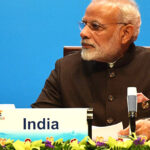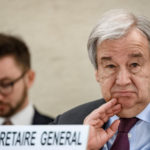
United Nations Secretary-General António Guterres announced on Jan 11 that he would be seeking a second five-year term. Guterres, a former prime minister of Portugal, campaigned for the position in 2016 with an agenda focused on UN reform, as well as positioned himself as someone who could bring consensus to persistent global challenges such as climate change and the forced displacement of people from around the globe. However, his tenure as the world’s top diplomat has been disappointing, marked by failures to address human rights abuses, initiate fundamental institutional reforms, or champion multilateralism in the face of withering criticism by an isolationist American administration.
Mr Guterres has been calculating since the announcement of his candidacy. His campaign was launched with the full expectation that Hillary Clinton would be elected President of the United States and his decision to seek a second term was not decided until after Joe Biden defeated Donald Trump in the 2020 election.
Those calculations are not the hallmarks of a leader that seeks to champion multilateralism and international cooperation, regardless of the political environment. Mr Trump’s ascendancy to the presidency should have corresponded with changes in strategy to deal with a more aggressive and hostile America.

Mr Trump’s rhetoric was predictable from the outset and while his disdain for international cooperation and multilateralism was apparent, America was not the only voice of criticism. During Mr Trump’s tenure as president, China was appointed to the UN Human Rights Council, serving from 2017 to 2019, and other human rights abusing states such as Cuba, Uzbekistan and Russia, are now serving three-year terms. Mr Guterres should have recognised the opportunity to voice support for fundamental reforms to the Council rather than be merely concerned about American delinquence on its financial contributions.
Mr Guterres should have learned the lessons of past secretaries-general, who have both advocated and promoted UN reform, such as that of the late Kofi Annan. Attuned to the reality that the Security Council had encountered difficulty in playing its vital role as the arbiter of peace and security, Annan suggested that “one should always take advantage of the accident of the calendar and really push for major [Security Council] reforms”.
Mr Guterres has been largely silent and his lack of attention stands in contrast to the current paralysis on human rights abuses, evidenced by China’s mass incarceration and dehumanisation of Uighur Muslims and the ongoing Syrian civil war. His record on human rights has always been problematic, from his dismantling of the UN’s Human Rights Up Front Initiative to his church-mouse diplomacy, aiming to avoid the slightest confrontation with the two Great Powers and Permanent Members of the Security Council. This has been much to the displeasure of the former UN High Commissioner for Human Rights Zeid Ra’ad al-Hussein and Kenneth Roth of Human Rights Watch, who have openly questioned Mr Guterres’ unorthodox or contrarian positions.
Outside organisations should not be the only voice of moral authority and Mr Guterres has failed to “name and shame” violators as mandated by the UN Charter. Even if all the criticism does not fall squarely on Mr Guterres’ shoulders, he has failed to stop its moral decline. When the UN had to atone for the poisoning of dozens of Roma children whose families were put into camps near a toxic lead-smelting factory, Mr Guterres failed to issue an apology, even after one was drafted by senior UN officials.
The UN must advance reform agendas with a candidate for secretary-general that is equal to the task. Mr Guterres has proven ineffective. Part of a strategy to reform the UN should also include efforts to break the glass ceiling of UN leadership for women. There is no shortage of qualified candidates, including former New Zealand prime minister and former UN Development Programme Administrator Helen Clark, the former Director-General of Unesco Irina Bokova and Kristalina Georgieva, the Managing Director of the International Monetary Fund.
Implementing structural reforms should include tacking the barriers that prevent women from ascending to top-level leadership as well as efforts to promote women from the global South. The UN needs a tough, measured and confident professional at the helm, rather than a timid, soft-spoken diplomat. Addressing persistent challenges such as the erosion of human rights, an ongoing democratic recession, chronic underfunding of the Sustainable Development Goals, and a climate emergency should start with someone new.






